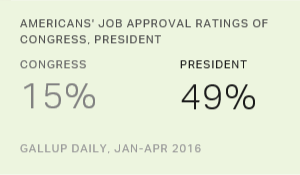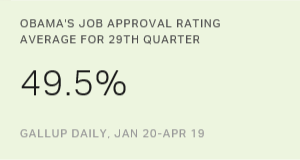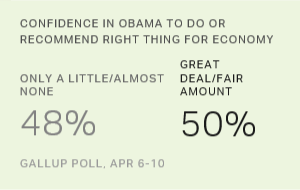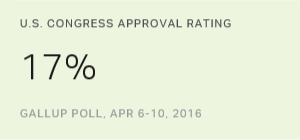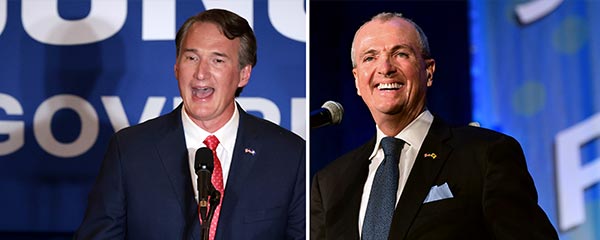Story Highlights
- Obama holds 34-percentage-point edge over Congress thus far in 2016
- Only George H.W. Bush enjoyed similar edge over Congress
- Obama approval remarkably high relative to U.S. satisfaction
PRINCETON, N.J. -- With President Barack Obama's job approval rating up nearly three percentage points in the first quarter, he continues to maintain a wide lead in approval over the popularity-challenged U.S. Congress. In fact, if maintained, the 34-percentage-point gap between Obama's 49% average job approval rating thus far in 2016 and the 15% average approval rating for Congress would be the widest of Obama's presidency, and one of the largest Gallup has measured since 1981.
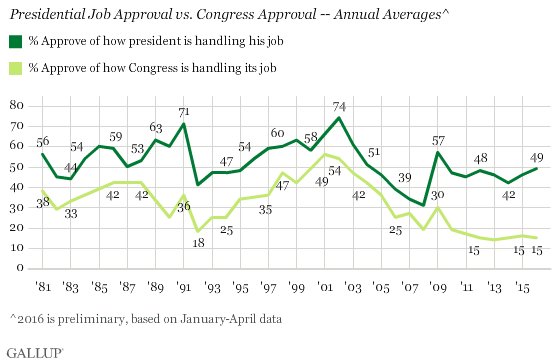
Congress approval was on the historically low side when Obama took office in 2009, related mainly to the troubled economy at the time. However, since then, his yearly job approval averages have managed to stay in the 40s while Congress' ratings have sunk to record-low levels. As a result, the gap between the two has averaged 30 points over the course of Obama's presidency and has not fallen below 27 points in any calendar year.
Obama's popularity edge over Congress is far from typical for recent presidents. George W. Bush's approval rating averaged 12 points higher than congressional approval across his two terms in office, from 2001 to 2008. Bill Clinton held an 18-point advantage over Congress in job approval from 1993 to 2000, while Ronald Reagan held a 13-point lead between 1981 and 1988 (with no congressional ratings in 1984 and 1985).
Only George H.W. Bush matches Obama in outperforming Congress in public approval, according to Gallup polling between 1990 and 1992. However, that is partly a reflection of Bush's extraordinarily high ratings stemming from the first Iraq War in the second and third years of his term, as well as image problems for Congress stemming from the "Keating Five" and the House banking scandal.
Obama Also Soars Above U.S. Satisfaction
Since the start of his presidency, Obama's average job approval rating has also been running substantially higher than Americans' average level of satisfaction with the nation, ranging from 18 to 30 points higher each year. Thus far in 2016, the gap between Obama's approval rating (49%) and public satisfaction with the direction of the country (26%) is a healthy 23 points. That compares with an average 12-point premium for George W. Bush and 10-point approval leads for Clinton and Reagan.
The only other president who consistently logged much higher job approval ratings than the prevailing level of U.S. satisfaction was George H.W. Bush. However, even his average 21-point job approval premium falls short of Obama's.
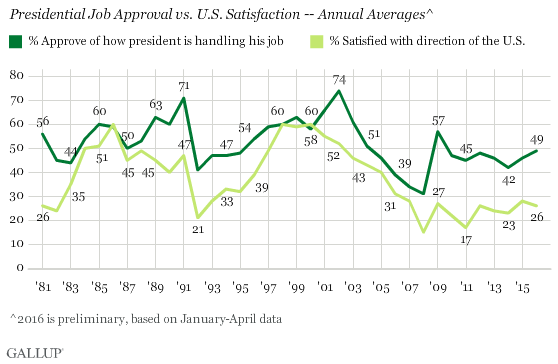
Bottom Line
Obama entered office with a significant advantage in popularity over Congress. But that gap has persisted long past his honeymoon period and could well emerge as one of the defining features of his presidency. However, it's not just Congress' low ratings that account for Obama's relatively high approval. He also receives higher approval than one would expect given Americans' low satisfaction with the direction of the country.
Obama's ability to outperform both congressional job approval and public satisfaction with the U.S. may be related to his personal popularity. Most recently, Gallup found 53% of Americans viewing him favorably. However, Obama's favorable rating is not unusually high relative to his job approval, at least compared with past presidents. The more important factor could be the extraordinarily high job approval he receives from Democrats, reflecting the strong political polarization in the country. This gives Obama a solid "floor" that keeps his job approval from falling too low, even while just 10% of Republicans approve. And that contrasts sharply with congressional ratings, which are poor among both parties, ensuring that the overall ratings for Congress remain low.
Historical data are available in Gallup Analytics.
Survey Methods
Obama's job approval ratings reviewed in this article are based on annual aggregates of data from the Gallup U.S. Daily tracking survey. The aggregates include roughly 150,000 interviews each year with a random sample of adults, aged 18 and older, living in all 50 U.S. states and the District of Columbia, interviewed by landline and cellular telephone. For annual results based on the total sample of national adults, the margin of sampling error is ±1 percentage point at the 95% confidence level. All reported margins of sampling error include computed design effects for weighting.
Congressional approval and U.S. satisfaction results are based on combined data from Gallup's monthly Gallup Poll Social Series surveys. These aggregates generally include at least 12,000 interviews each year with a random sample of adults, aged 18 and older, living in all 50 U.S. states and the District of Columbia, interviewed by landline and cellular telephone. For annual results based on the total sample of national adults, the margin of sampling error is ±1 percentage point at the 95% confidence level. All reported margins of sampling error include computed design effects for weighting.
Learn more about how the Gallup U.S. Daily and the Gallup Poll Social Series work.
